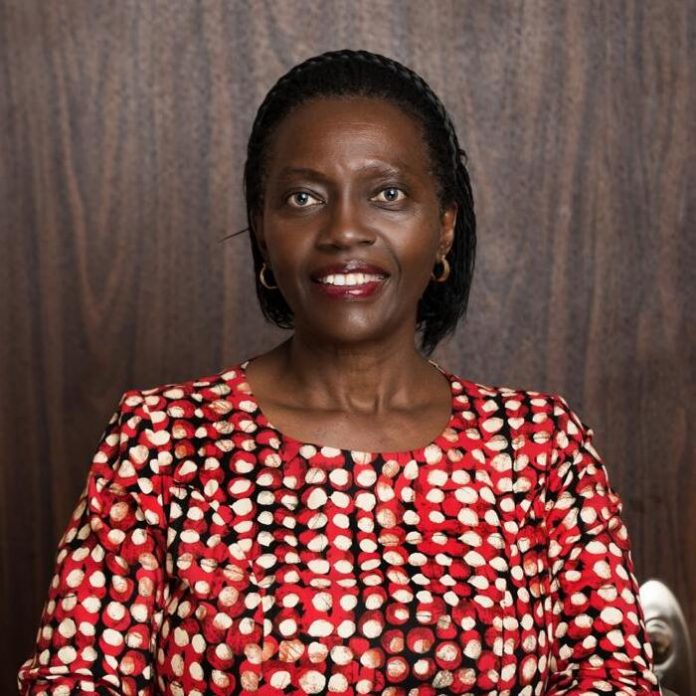For the first time in Kenya’s history, a female candidate joins the centre stage in one of the main political coalitions in the country’s August elections.
It is unprecedented for large political blocs with a real chance of winning a Kenyan election to have a woman as a running mate.
In May, veteran politician Martha Karua was announced as the deputy presidential candidate for the Azimio la Umoja alliance led by Raila Odinga.
Karua’s background as a fervent democracy and integrity campaigner, as well as representing the important Kikuyu voting bloc in Kenyan politics, are important reasons for her appointment. Her candidacy is also interpreted as a strategy to win over female voters and signal that their concerns matter.
Gender equality is on the election agenda in Kenya, with the two presidential front runners competing for women’s votes.
The Azimio alliance has embedded a strong gender equality element in its campaigning and presented its leadership as one that promotes gender balance. Karua’s candidacy has helped underscore this point.
Karua, a lawyer and former minister of justice and constitutional affairs, is a veteran politician. She first became an MP in 1992, and made a stab at the presidency in the 2013 elections, representing a smaller party and receiving 0.36% of the votes.
Women across the world face unique hurdles when running for office in institutions dominated by men. Kenya is no exception. Karua’s opponents have sought to undermine her on the basis of her gender.
The 2022 race is heated, with concerns about hate speech. Research has also highlighted the prevalence of sexist rhetoric in the body politic.
So, what does Karua’s appointment mean for women in politics? And what would be the possible implications for gender equality in Kenya if she came to power as deputy president?
Opponents of Karua’s political bid began to discredit her immediately after the announcement that she would be a running mate. The attacks were personal and gendered.
In one example, presidential candidate William Ruto and his running mate, Rigathi Gachagua, discredited Karua during campaigns in Central Kenya, an important voting bloc. Speaking in Swahili, they referred to her as “huyo mama” – meaning “that woman”, and did not call her by name.
In another campaign event, MP Sylvanus Osoro called into question Karua’s credibility to lead when addressing party supporters. He termed her unfit for the role of deputy president because she wasn’t married. He insinuated that this indicated she was unreliable and would walk out of government should her coalition win.
Karua’s age and how it intersects with gender has also been used against her. Rival politicians have referred to her as “cucu”, a Kikuyu term for grandmother. She is 64.
In a country where politics of personalities reign, Karua’s competence is framed and viewed in a gendered lens.
Critics point out that she has begun to conform to traditional norms about women. There certainly is evidence that she has changed her political image and strategy from previous campaign bids.
For instance, she is said not to have been aggressive enough in the presidential debate, a sharp divergence from her long-term political persona as a firebrand and articulate debater. Kenyan media had long branded Karua an “iron lady”.
Karua has nevertheless crafted her call for support from different demographic groups in gendered terms. Rather than ignore negative gender rhetoric, she is taking it on and echoing the rhetoric as a way to appeal to women, men, mothers and grandmothers. While promoting her alliance’s social safety net programme, she addressed single mothers directly: “I am one of you and we have plans for you.”
Speaking on Azimio’s youth employment agenda, she portrayed herself as a mother of this age group: “If you see your mother represented somewhere, she won’t forget your problems.”
The Azimio duo also refer to themselves as “Mama” (mother) for Karua, and “Baba” (father) for Odinga, a term denoting his veteran politician status.
Karua refers to Azimio’s possible win as ushering in “serikali ya baba na mama”, which means a “mother’s and father’s government” – an analogy drawn from a traditional family set-up in Kenya where a mother and father have distinct roles. It’s clear that, yet again, both sides of the election campaign in Kenya are entrenching gender stereotypes.
The appointment of Karua as Odinga’s running mate must, however, be seen as a significant step forward.
If Karua’s alliance wins, she will be the first female deputy president in Kenya, a significant and symbolic win for the women of Kenya.
• Elfversson is associate professor, Uppsala University while Höglund is professor of peace and conflict research at the same university. This article, which first appeared on The Conversation, was also co-authored by Amina Ahmed, a Rotary Peace Fellow and research assistant at the department of peace and conflict research at Uppsala
Follow @SundayWorldZA on Twitter and @sundayworldza on Instagram, or like our Facebook Page, Sunday World, by clicking here for the latest breaking news in South Africa. To Subscribe to Sunday World, click here



